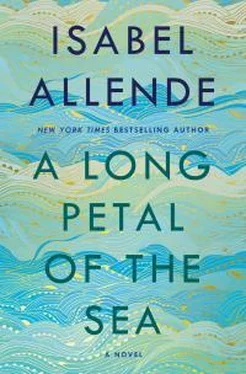“How can I be of help, comrade?” he said.
“They’re going to make the plane turn around…They’re going to take me back to…” the man said, bursting into tears.
“Stay calm, we’ve been in the air for almost an hour, I’m sure we’re not going back to Santiago. This is a direct flight to Caracas; you’ll be safe there, you’ll have help. I’ll get you a drink, you need it.”
“Make it something to eat,” the other man begged him.
—
ROSER HAD SPENT LONG periods in Venezuela with the Ancient Music Orchestra. She gave concerts, had made friends, and moved easily in a society whose rules of behavior were different from those of Chile. Valentin Sanchez had introduced her to everyone worth knowing, and opened the doors to the world of culture. Her love affair with Aitor Ibarra had ended years before, but they were still friends, and she visited him from time to time. His stroke had left him a semi-invalid, and he had some difficulty getting his words out, but it hadn’t affected his mind or diminished his instinct for dreaming up new businesses, which his eldest son supervised. His house was high up in Cumbres de Curumo, with a panoramic view over Caracas. He grew orchids, collected exotic birds and custom-made cars. It was a gated community with a leafy park containing several houses, protected by a barrier wall and an armed guard. Two of his married children also lived there, and several grandchildren.
According to Aitor, his wife never suspected the lengthy relationship he had had with Roser. Roser doubted this was true, as they must have left many clues over the years. She concluded that the beauty queen had tacitly accepted that her husband was a womanizer, like many men for whom that was a proof of virility, but chose to ignore it. She was the legitimate wife, the mother of his children, the only one who counted. After Aitor was left paralyzed, she had him all to herself, and she came to love him more than before, because she discovered his great virtues, ones she hadn’t been able to appreciate in the hustle and bustle of their previous existence. They were growing old together in perfect harmony, surrounded by their children.
“As you can see, Roser, every cloud has a silver lining, as the saying goes. In this wheelchair I’m a better husband, father, and grandfather than I would be if I were able to walk. And even though you might not believe me, I’m happy,” Aitor told Roser on one of her visits. In order not to disturb her friend’s peace of mind, she chose not to tell him how important the memory of those afternoons of kisses and white wine was to her.
They had both promised they would never reveal this past love to their partners—why hurt them?—but Roser didn’t keep her side of the bargain. In the two days between Victor’s liberation from the camp and his asylum in the embassy, they fell in love as if they had just met. It was a luminous discovery. They had missed each other so much that when they reunited they didn’t see each other as they really were, but as they had been when they were sad youngsters pretending to make love with whispers and chaste caresses in the Winnipeg lifeboat. She fell in love with a tall, tough stranger, his features sculpted like dark wood, his eyes gentle and his clothes freshly ironed, someone who was capable of surprising her and making her laugh with silly remarks, who gave her pleasure as if he had memorized the map of her body, who cradled her all night long so that she fell asleep and woke nestled against his shoulder, who told her what she had never expected to hear, as if suffering had demolished his defenses and made him sentimental.
Victor fell in love with the woman he had previously loved with a brother’s incestuous love. She had been his wife for thirty-five years, but it was only during those days of their re-encounter that he saw her stripped of the burdens of the past: her role as Guillem’s widow and Marcel’s mother. She was a youthful, fresh apparition. In her fifties, Roser was revealed to him as sensual, filled with enthusiasm, with an endless reserve of fearless energy. She detested the dictatorship as much as he did, but she didn’t fear it. Victor realized that, in fact, she had never shown any sign of fearing anything, apart from traveling by plane, not even in the last days of the Spanish Civil War. She was facing exile now with the same courage as she had done then, without complaining, without looking back, her eyes fixed on the future.
What kind of indestructible material was Roser made of? How was it that he had been so lucky to have her for so many years? And how could he have been so stupid not to love her from the start the way he loved her now? He never imagined that at his age he could fall in love like an adolescent or feel desire like wildfire. He looked at her enraptured, because still intact beneath her appearance as a mature woman was the innocent, formidable little girl Roser must have been when she looked after goats on a hillside in Catalonia. He wanted to protect and care for her, even though he knew she was stronger than he was whenever they suffered misfortune. He told her all this and much more in the days after their reunion, and he was to go on repeating them all the days that followed.
It was during those evenings of confessions and memories—when they shared glories, wretchedness, and secrets—that she first told him about Aitor Ibarra. Listening to her, Victor felt a bullet in his chest that knocked the wind out of him. The fact that, as Roser assured him, their adventure had ended long ago only partly consoled him. He had always suspected that on her travels she had taken a lover, or perhaps even several, but the confirmation of this longstanding, serious love awoke in him retrospective jealousy that would have destroyed the happiness of the moment had Roser allowed it. With her implacable common sense, she showed him she had not robbed him of anything to give to Aitor. She had not loved him any the less, because that love was always hidden in another chamber of her heart and didn’t interfere with the rest of her life. “Back then you and I were great friends, confidants, accomplices, and spouses, but not lovers the way we are now. If I’d told you about him at the time it would have upset you a lot less, because you wouldn’t have seen it as betrayal. And anyway, you’ve been unfaithful to me as well.” This comment startled Victor, as his own infidelities had been so insignificant he could scarcely recall them, and he never imagined she knew about them. He grudgingly accepted her argument, but continued sulking for a while, until he eventually realized it was useless to stay bogged down in the past. As his mother used to say, “What’s done is done.”
Venezuela received Victor with the same easygoing generosity with which it took in thousands of immigrants from many parts of the world, the most recent of whom were refugees from the dictatorship in Chile and the dirty wars in Argentina and Uruguay, as well as Colombians who crossed the frontier illegally, fleeing poverty. Venezuela was one of the few democracies left in a continent dominated by heartless regimes and thuggish military juntas. Thanks to the endless flow of oil from the ground, it was one of the wealthiest countries in the world, and was also blessed with other minerals, an exuberant nature, and a privileged position on the map. There were so many natural resources that nobody killed themselves working; there was plenty of space and opportunity for whoever wanted to come and set themselves up. Life was one long party, with a great sense of freedom and a profound sense of equality. Any excuse was good enough to celebrate with music, dancing, and alcohol. Money seemed to pour out endlessly; everyone benefited from corruption.
“Don’t be deceived, there’s a great deal of poverty, especially in the provinces,” Valentin Sanchez warned Roser. “Every government has forgotten the poor. That creates violence, and sooner or later the country will pay for that oversight.” To Victor, who came from a sober, cautious, prissy Chile now repressed by the dictatorship, such exuberant joy seemed shocking. He thought people were superficial, that nothing was taken seriously; there was too much wastefulness and ostentation, everything was for the moment and fleeting. He complained that at his age it was impossible for him to adapt, that he wouldn’t live long enough, but Roser argued that if at sixty he could make love like a youngster, to adapt to this wonderful country would be easy. “Relax, Victor. Going around in a sulk will get you nowhere. Pain is unavoidable, but suffering is optional.”
Читать дальше











